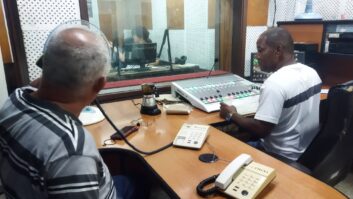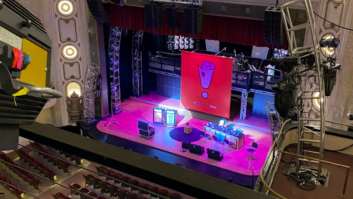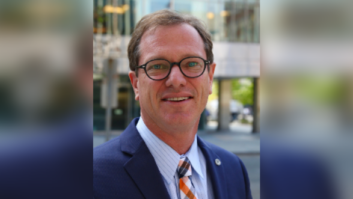“The abundance of the USA belongs to the people, all the people, and no one faction has the right to deny the other liberty, justice and the pursuit of happiness,” said Robert Williams in 1962.
He was speaking via radio to listeners in the American South, but he was doing so from Cuba.
Williams had served as president of the local NAACP chapter in Monroe, N.C., in the late 1950s. As Timothy Tyson’s book “Radio Free Dixie” explains, Williams favored “armed self-reliance,” not non-violence.

According to a summary of the 1999 book ‘Radio Free Dixie,’ Williams and his followers ‘used machine guns, dynamite and Molotov cocktails to confront Klan terrorists.’ Williams challenged both white supremacists and the civil rights establishment. He fled to Cuba, where he broadcast a radio program for several years.
According to the documentary film “Negroes With Guns: Rob Williams and Black Power,” Williams had not only revitalized the NAACP chapter but also filed for a charter from the National Rifle Association and formed an armed group committed to the protection of Monroe’s black population, “to keep the peace and come to the aid of black citizens, whose calls to law enforcement often went unanswered.”
He conducted local civil rights campaigns and urged national media to focus on conditions in the South. When a white man was acquitted in an attempted rape of a black woman, he publicly stated that if the Constitution could not be enforced, “it is time that Negroes must defend themselves even if it is necessary to resort to violence … If it is necessary for us to kill we must be willing to kill.” The NAACP suspended him for advocating violence.
During a protest melee, Williams sheltered a white couple from an African American mob but was then accused of kidnapping them. He fled with his family to Cuba via Canada in 1961, eluding both the KKK and FBI.
Imperialist music
Cuba and Williams were not strangers. He had visited Havana the previous year, appearing on television and giving lectures throughout the country. With Williams back in Cuba, Havana’s Union Radio announced that he “hoped to reach a great number of Negroes in the south of the United States through the powerful radio station ‘Radio Havana Cuba.’”
“Williams was always intent on getting his message out,” explains Jon Elliston, author of “Psywar on Cuba.”
“Robert Williams Reports” became a regular part of Radio Havana’s English program by 1962, but it was heard at first only on shortwave. Williams described what happened next in oral history interviews with Robert Cohen and Thomas Mosby.
He wanted to be on AM with his own radio program, but faced opposition from American communists exiled in Cuba as well as elements of the Cuban government. He had listened to Cuba on the AM band when he was living in North Carolina; he knew AM was the way to reach an American audience. At first Cuban authorities tried to direct him to a weak AM station rather than the 50,000 watt one he wanted. Williams insisted and got his station.
He also faced opposition over programming, being urged to do a program for the white working class. He thought issues of blacks should be addressed first, and prevailed.
There was a battle over music next. Williams wanted to play the latest jazz. But this was “imperialist music” and he was urged to play Cuban opera instead. He explained that no one would listen to his words if they were accompanied by unpopular music.
The opposition in the Cuban government delayed three months; it apparently took the intervention of Fidel Castro to get Williams on AM with his desired programming.
Williams called his program “Radio Free Dixie” and invited people to tune in every Friday night from 11 p.m. to midnight Eastern on 690 kHz for “jazz, Afro-American folklore, news, interviews and commentary” from “the free voice of the South.” CMBC transmitted with 50,000 watts from Havana. Some American newspapers issued Williams’ press release announcing the program.
Radio propaganda
Radio Free Dixie became part of the ongoing radio war between the United States and Cuba.
The U.S. Foreign Broadcast Information Service described Williams’ program as “radio propaganda.” Other exiles and Cubans broadcast on “The Friendly Voice of Cuba” in English. Others directed shows in Spanish targeting Peru, Guatemala and the Dominican Republic, programs that the FBIS described as encouraging “subversion of the incumbent governments.”
The United States ran a CIA front station called Radio Americas (originally Radio Swan), transmitted on AM and shortwave and directed towards Cuba. Other front groups purchased time on American AM and shortwave stations.
Cuban radio was not Williams’ only radio outlet. WBAI(FM) in New York City aired an interview with him in May 1962. The program prompted at least one listener to write Attorney General Robert Kennedy to do something about racial injustice in the United States. Williams supplied programs that aired on WBAI as well as sister Pacifica stations in California. Williams republished the radio commentaries in his newsletter “The Crusader,” distributed in the United States via Canada.
Radio Free Dixie eventually expanded to three times a week, with additional broadcasts at midnight on Sundays and Tuesdays. “We know that he was reaching a large part of the South,” Elliston says.
Return home
The New York Times wrote that Radio Free Dixie’s tone was growing “increasingly violent” by 1964, described by Dixie as the “year of revolution.” One program that year described various means of sabotage.
“I believe that self-defense will bring Americans to their senses. But if it doesn’t then they don’t deserve to exist and they will be destroyed,” Williams told the National Guardian newspaper that year.
But Radio Free Dixie lost the fight two years later. In Williams’ view, American communists and their Cuban government supporters failed to support his cause. Dixie was preempted a few times; Williams then received complaints from listeners that they could no longer hear him. The Cuban authorities claimed that there were technical difficulties with 690 and they could only operate it at 1,000 watts.
Williams wanted out. He told the Cubans that he wished to help the North Vietnamese improve their propaganda directed to American troops fighting in the Vietnam War. That got him out of Havana, but Williams went to China instead of North Vietnam. Williams saw that China was in the midst of the upheaval of the Cultural Revolution and decided not make a radio program there.
He returned to the United States in 1970. According to the documentary film “Negroes With Guns,” Williams later advised the State Department on normalizing relations with China, and took a position as a research associate at the Institute for Chinese Studies at University of Michigan.
North Carolina dropped the kidnapping charge in 1976. Williams died in 1996 and was buried in Monroe.
For more on this topic including audio of music and speeches, see www.pbs.org/independentlens, key phrase Radio Free Dixie.
Hans Johnson is a freelance writer living in Southwest Florida.He has been writing about broadcasting for almost 20 years and founded Cumbre DX in 1994.












